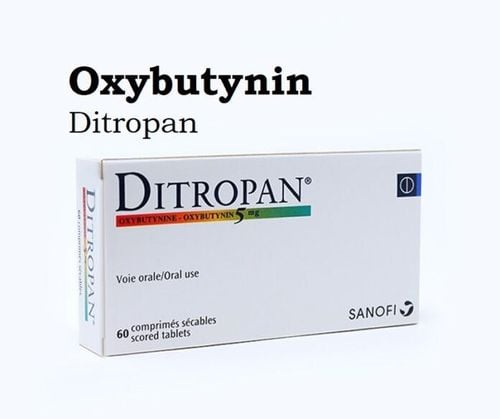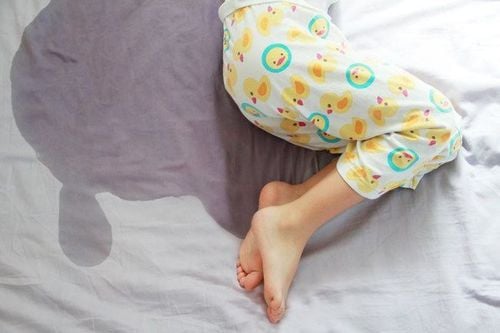This is an automatically translated article.
The article is professionally consulted by resident Doctor Duong Van Sy - Department of Pediatrics - Neonatology - Vinmec Hai Phong International General Hospital.
Bedwetting is a common condition in children. However, if it becomes frequent and the urine output is high, the child may have a medical problem and need to see a doctor.
1. What is bedwetting?
Bedwetting is urinary incontinence, when sleeping, occurring at night or at noon. Common in about 10% of children between the ages of 5-6 years. Bedwetting can happen at any time of the day, but is most common at night during sleep.
If the child still has urinary incontinence when awake, this phenomenon is usually a pathology, bedwetting when awake and asleep should not be considered the same.
In children from 0-3 years old, when they can't control their own will, bedwetting is a very normal thing. When children grow up a little more, when there is a need to go to the toilet, they will cry out for their parents to help. But by the age of 5 and on, and often over 7 years old, children still urinate naturally at night, which is not normal.
Trắc nghiệm: Nhận biết sớm dấu hiệu chậm phát triển thể chất và trí tuệ ở trẻ
Nếu 6 tuổi không biết đếm số, 7 tuổi vẫn chưa phân biệt được giữa thực tế và tưởng tượng thì có thể bé chậm phát triển thể chất và trí tuệ hơn so với bạn bè cùng lứa. Bạn đã nhận biết được các dấu hiệu bất thường sớm này chưa? Cùng làm nhanh bài trắc nghiệm sau để trang bị thêm kiến thức cho mình nhé!
The following content is prepared under supervision of Thạc sĩ, Bác sĩ y khoa, Ma Văn Thấm , Nhi , Phòng khám Đa khoa Quốc tế Vinmec Dương Đông(Phú Quốc)
2. Causes of bedwetting
The main cause of bed-wetting is still not completely clear. However, bedwetting can be caused by an immature bladder due to infancy, or by decreased nighttime secretion of an antidiuretic hormone (also called hormone) in some children.
Bedwetting can also be caused by psychological causes, including: children under psychological stress such as being scolded by teachers, bullied by friends, separated from the group, phobias or constantly witnessing Parents' quarrels, parents' divorce, or the mother gives birth to another child... are psychological factors affecting bed-wetting in children. Deep sleep also reduces the feeling of bladder fullness.
It is also said that the cause is genetic. One in one parent with bedwetting in childhood has a 44% chance of having it or when both parents have it, 77% of the child will have bedwetting.
There are also physical causes accounting for 1-2% such as urinary tract malformations, urinary tract infections, pinworm infections, kidney failure, diabetes,... or constipation that also causes enuresis in children. young.
3. Diagnosis
Diagnose a child with bedwetting by keeping a 24-hour diary of the amount of water the child drinks and the amount of urine the child urinates.
If the child has abnormalities, a total urinalysis should be done.
Criteria for diagnosing a child with bedwetting include:
Urinating in bed or urinating repeatedly (either unintentionally or on purpose) during the night. Occurs regularly 2 times/week for at least 3 consecutive months. Age of at least five years (or equivalent development). Younger children are not considered bedwetting. Bedwetting is the uncontrolled excretion of urine during sleep, occurring at an age where bladder control is established (approximately 4 to 5 years of age). Bedwetting is not a direct result of a substance (eg, a diuretic) or a systemic illness (eg, diabetes, spina bifida, epilepsy, etc.).
4. Treatment

Before starting treatment, it is necessary to find out if the child is ready. and cooperates with treatment or not? Treatment should not be forced on children.
Treatment of bedwetting often takes a long time, so children need to be monitored and treated by a doctor within 4 months.
Parents and children also need to understand that bedwetting is completely unintentional, and should not punish or reprimand the child with words or hitting the child inappropriately.
4.1 Behavioral Treatment Remind your child to pee before going to bed. Every 2-3 hours, the child should be woken up and asked if he or she needs to urinate. Do not use diapers (especially for children over 8 years old) Spread a waterproof sheet on the child's mattress to avoid odors Advise the child to change clothes when bedwetting Snow is not to tease the child when the child has bedwetting. 4.2 Motivational treatment Motivate and motivate the child with symbolic rewards when the child does not wet the bed. Bladder exercise if the child has a small bladder capacity. Example: 6-year-old child – bladder capacity is about 240ml. Teach your child to hold urine longer during the day. Note:
Children over 7 years old, before drug treatment, should treat with behavioral techniques from 3-6 months.
Drug treatment:
Desmopressin (DDAVP) Tricyclic antidepressants However, drug treatment will be expensive in terms of costs and have many side effects, but the recurrence rate is high.
In summary, having a child with bedwetting does not affect the child's health or normal physical development. But if bedwetting continues in older children, especially over 10 years old, it will cause them complex psychological problems. They will be the center of attention from their peers, ridiculed, and lose confidence, stress, sadness, and possibly depression. Over time, the children's temperament will become abnormal, uncomfortable and difficult to integrate. This situation is not good for the baby's development in the future. Therefore, it is necessary to take the child to a medical facility for timely intervention.
Parents can take their children to Vinmec International General Hospital, which is one of the leading hospitals in the country for examination, diagnosis and treatment of digestive, urinary, and respiratory diseases. , special nutrition in infants and young children. With modern equipment, sterile space, minimizing the impact as well as the risk of disease spread. Along with that is the dedication from the doctors with professional experience with pediatric patients, making the examination no longer a concern of the parents.
Doctor Duong Van Sy has 09 years of experience in the field of Pediatrics with strengths in examination, consultation and treatment of diseases in children; Emergency resuscitation, anti-poisoning for infants and children, .. and is currently a resident doctor of Pediatrics - Neonatology Department of Vinmec Hai Phong International General Hospital.
If you have a need for consultation and examination at Vinmec Hospitals under the nationwide health system, please book an appointment on the website for service.
Please dial HOTLINE for more information or register for an appointment HERE. Download MyVinmec app to make appointments faster and to manage your bookings easily.















